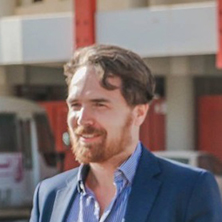Seton Hall Professor Joins Panel on Memory Politics
Meg Gawron
International News Editor
Chatham House, an international affairs think tank, hosted a panel discussion on October 5 called Memory Politics: The Challenge of Commemoration in Post-Soviet Eastern Europe and the Caucasus. The panel was moderated by L’ubica Pollakova of Chatham House and featured Dr. David Wood, a professor from Seton Hall University’s School of Diplomacy and International Relations, Dr. Hans Gutbrod of Ilia State University, and Dr. Olesya Khromeychuk of the Ukrainian Institute London.
Speaking together, Wood and Gutbrod set a framework for when and how memory politics should be implemented. Gutbrod emphasized the necessity of this framework, explaining that when memory is not properly managed and appreciated, misconceptions begin to fill a sort of ‘ideological vacuum.’ Wood reinforced this, underscoring that “peace isn’t possible without dealing with the past.” While there is no current ‘ethics of commemoration,’ both Wood and Gutbrod hope to set certain standards for how commemoration should be treated.
Dr. Hans Gutbrod paralleled this new framework of memory politics to the existing framework for the Just War Theory. Gutbrod covered Lus ad Memoriam—the question of whether governments should use commemoration. Lus ad Memoriam covers three main categories: Right Intention, Legitimate Authority, and Reasonable Chance of Success. He clarified that the framework that he and Wood presented should only extend to the public sphere and should not be used to govern personal remembrance or artistic expression.
For an act of commemoration to have the right intention, the people commemorating the event should not aim to sway the opinion of the public. Acts of commemoration are meant to honor the past, which cannot be done by focusing on one account of the events. Similarly, legitimate authority means that the people who are allowing the commemoration should not be doing so to assert their authority or undermine the authority of others.
Gutbrod emphasized that when officials use the commemoration to create authority for themselves, they undermine the people’s trust and the integrity of the past. Reasonable Chance of Success is what the name implies, which Gutbrod explained should be established through empirical social data. A project should not be undertaken unless officials are certain that the people will be receptive to it.
Dr. David Wood followed Gutbrod’s presentation by discussing Lus in Memoriam—the question of how people should use commemoration. In his presentation, Wood highlighted that understanding the past means understanding the future. These understandings impact how people treat one another and view the reliability of institutions. An abuse of memory politics easily lends itself to public distrust in officials and political institutions, just as the same kind of corruption can lead to animosity between historically opposing groups. Speaking from his experience mitigating conflicts in Northern Africa, Wood described that the proper treatment of memory “is a proven process to stopping war, stopping violence.”
To show how memory politics should and should not be implemented, Wood analyzed two applications of memory politics: The Aurora Prize and memory laws. The Aurora Prize was created on behalf of the victims of the Armenian genocide, given to those who have taken extraordinary efforts to save lives or engage in humanitarian work.
Wood and Gutbrod applaud the Aurora Prize as commemorating the Armenian genocide in a way that acknowledges loss without focusing on villainization. Instead, the Aurora Prize encourages and rewards positive actions. In contrast, memory laws in Eastern Europe restrict how things may be remembered. Wood and Gutbrod criticize these as shielding authorities from criticism and forcing the public into circular narratives, through which they are exposed to echo chambers of homogenous thought that often lead to ‘othering’ the minority view.
Dr. Olesya Khromeychuk, who is from Ukraine, offered examples of how memory politics are currently being engaged in Ukraine and Russia. Khromeychuk emphasized that conflicts between Ukraine and Russia are not solely military engagements; they are information wars. For the 80th anniversary of the Babi Yar massacre, the massacre of over 30,000 Jews in Kyiv during World War II, Ukraine is creating a new memorial to honor the memory of the lost.
However, the initial project, designed by lawyers, local officials, and the Ukrainian Cultural Society, was sidelined in favor of a project sponsored by people with ties to the Kremlin. Khromeychuk criticized this, explaining that while Ukraine has improved its memory politics over the past decade, the shift in the Babi Yar Memorial project will be detrimental to the country and its people.
All three panelists acknowledged that getting political groups to adhere to the framework set out during the panel is a difficult task. However, if people do not at least try, then the past will easily overwhelm the future.

